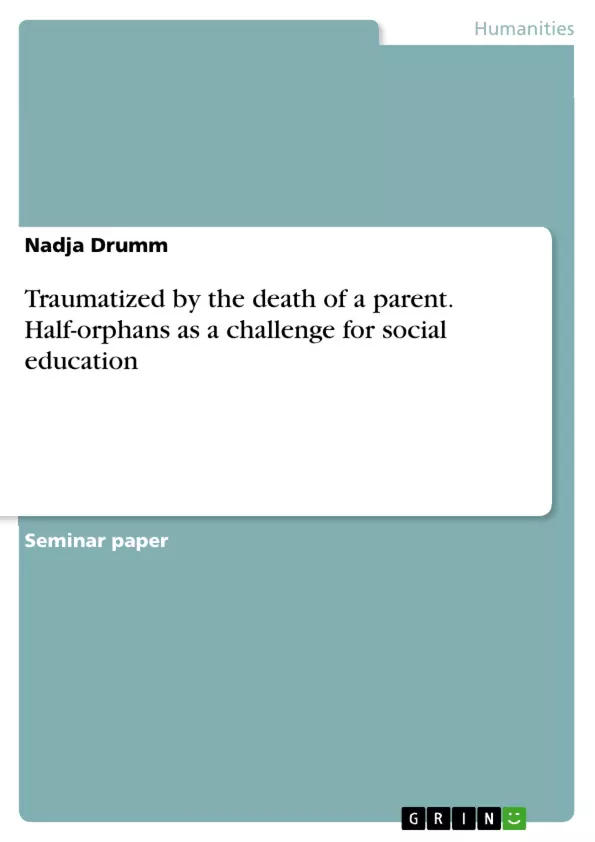As long as the parents are alive, we are still children who do not take death seriously.
But when they die, it is as if a wall that separated us from death were torn down.
Christian Fürchtegott Gellert
The death of one's parents is a dramatic and devastating experience for most people. However, by adulthood one has usually become largely detached from one's parents and developed into an autonomous person, so that the loss of one's parents can be dealt with appropriately after a period of grief. However, children are - the younger the more - physically and emotionally dependent on the affection and care of their parents, so much that the loss of a parent, their primary caregiver, often overwhelms the child's coping mechanisms to a great extent. The death of the parents is therefore, in most cases, a traumatic experience in childhood. If the surviving parent cannot give the child the necessary support and security as a result of this experience, it is advisable to seek professional help. While psychotherapy is a recognized method for dealing with traumatized children, the possibilities of education in this context are largely neglected. In agreement with Weiss, I am extremely critical of the tendency of many social workers to delegate work with traumatized children to the closed framework of therapy because of their own insecurities, because these children are not only traumatized children in the therapeutic setting, but also in the educational. Unfortunately, social pedagogy has so far not dealt with this topic enough, so that Denner's demand to "develop a socio-pedagogical model for dealing with traumatized children and young people" has not yet been realized. Knowing this deficit, I would like to discuss the possibilities of a socio-educational intervention for children who have been traumatized by the death of a parent.
Table of Contents
- 1. Introduction
- 2. Trauma and child - a conceptual link
- 3. The death of the parents as a traumatic experience
- 3.1 The interaction of grief and trauma
- 3.2 The trauma of parental loss against the background of attachment theory
- 3.3 Influencing factors of child grief or trauma work
- 4. Possibilities of pedagogical action in the face of traumatic loss experience in childhood
- 4.1 Withstand trauma-specific re-staging: Maintaining a relationship, demonstrating security
- 4.2 Cognitive re-evaluation of what has been experienced as a pedagogical intervention (?!)
- 4.3 Psychoeducational parenting as indirect help for traumatised children
- 5. Concluding remarks
Objectives and Key Themes
This term paper examines the impact of parental death on children, exploring the traumatic experience of losing a primary caregiver and analyzing the possibilities of socio-educational intervention. The paper focuses on the specific needs of half-orphan children and the potential for social pedagogy to offer support and guidance in the aftermath of such a loss.
- The nature of trauma and its impact on children
- The specific challenges of parental loss in childhood
- The role of attachment theory in understanding child trauma
- Strategies for socio-educational intervention with traumatized children
- The importance of maintaining security and stability for grieving children
Chapter Summaries
- Chapter 1: Introduction - This chapter introduces the topic of parental death as a traumatic experience for children and highlights the need for socio-pedagogical intervention. It also presents the structure and scope of the paper.
- Chapter 2: Trauma and child - a conceptual link - This chapter explores the definition and nature of trauma, particularly in the context of childhood. It discusses the impact of traumatic events on children's emotional development and the challenges they face in processing these experiences.
- Chapter 3: The death of the parents as a traumatic experience - This chapter focuses specifically on the death of a parent as a traumatic event for children. It explores the interaction between grief and trauma, the impact of attachment theory on understanding child trauma, and the various factors that influence the processing of grief and trauma in children.
- Chapter 4: Possibilities of pedagogical action in the face of traumatic loss experience in childhood - This chapter explores the possibilities of pedagogical action in supporting children who have experienced parental death. It discusses the importance of maintaining relationships and demonstrating security, cognitive re-evaluation as a pedagogical intervention, and psychoeducational parenting as a means of indirect support.
Keywords
This paper focuses on the intersection of trauma, grief, and social pedagogy in the context of parental death. Key themes include child trauma, attachment theory, socio-educational intervention, trauma-specific re-staging, cognitive re-evaluation, and psychoeducational parenting.
Frequently Asked Questions
Why is the death of a parent considered traumatic for children?
Children are physically and emotionally dependent on their primary caregivers. Losing them overwhelms their coping mechanisms and disrupts their sense of security.
What is the role of social pedagogy in helping half-orphans?
Social pedagogy provides educational support, maintains stable relationships, and offers a safe environment for children to process their loss outside of a clinical therapy setting.
How does attachment theory relate to childhood trauma?
Attachment theory explains how the loss of a primary attachment figure can lead to severe emotional distress and long-term development issues if not addressed properly.
What is psychoeducational parenting?
It is a form of indirect help where surviving parents or caregivers are educated on how to provide the necessary stability and emotional support to a traumatized child.
Can pedagogical intervention replace psychotherapy?
While psychotherapy is essential for deep trauma, pedagogical intervention is crucial for the child's daily life and social integration, filling a gap often neglected by purely clinical approaches.
- Citar trabajo
- Nadja Drumm (Autor), 2007, Traumatized by the death of a parent. Half-orphans as a challenge for social education, Múnich, GRIN Verlag, https://www.grin.com/document/1171151



